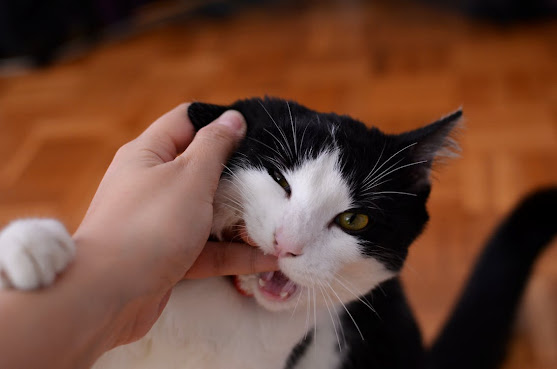Cats are often seen as affectionate and friendly pets, but sometimes they can also display aggressive behaviors, such as biting. Cat bites can be painful and can even lead to infections if left untreated. As a cat owner, it can be concerning and frustrating when your beloved pet bites you seemingly out of nowhere. In this article, we will explore some of the reasons why cats may bite their owners and how to prevent it from happening.
Playful behavior
One common reason why cats may bite their owners is due to
playful behavior. Kittens especially tend to play rough with their owners,
using their sharp claws and teeth to play-fight. While this behavior may be
cute and endearing when they are young, it can become a problem as they grow
older and become stronger.
To prevent this type of biting behavior, it is important to
provide your cat with plenty of toys to play with, such as scratching posts,
catnip toys, and feather wands. This will redirect their playful energy and
keep them entertained.
Fear or anxiety
Another reason why cats may bite their owners is due to fear
or anxiety. Cats can become scared or anxious for a variety of reasons, such as
loud noises, unfamiliar surroundings, or being introduced to new people or
animals. When a cat feels threatened, they may resort to biting as a way to
defend themselves.
To prevent this type of biting behavior, it is important to
create a safe and secure environment for your cat. Provide them with a
comfortable and cozy bed, a hiding spot, and plenty of toys to keep them
entertained. If your cat is fearful or anxious around new people or animals,
introduce them slowly and gradually to avoid overwhelming them.
Pain or discomfort
Sometimes, cats may bite their owners as a result of pain or
discomfort. For example, if a cat is experiencing dental pain, they may lash
out and bite when their mouth is touched. Cats may also bite if they are
experiencing joint pain or other types of discomfort.
To prevent this type of biting behavior, it is important to
take your cat to the vet for regular checkups and to address any health issues
as soon as they arise. Additionally, be gentle when handling your cat and avoid
touching any areas that may be causing them pain or discomfort.
Redirected aggression
Cats may also display redirected aggression, which occurs
when they are unable to attack the source of their aggression and instead turn
on their owner. For example, if a cat sees a bird outside but is unable to
reach it, they may become frustrated and lash out at their owner.
To prevent this type of biting behavior, it is important to
identify and address the source of your cat's aggression. This may involve
providing your cat with a window perch or other ways to observe the outside
world, as well as addressing any underlying behavioral issues.
Overstimulation
Finally, cats may bite their owners due to overstimulation.
This can occur when a cat is being petted or played with and becomes
overwhelmed by the stimulation. In some cases, the cat may bite as a way to
signal that they have had enough.
To prevent this type of biting behavior, it is important to
pay attention to your cat's body language and to stop petting or playing with
them if they show signs of overstimulation, such as twitching their tail or
flattening their ears. Give your cat plenty of space and time to rest and
relax, and avoid overstimulating them in the future.
In conclusion, there are many reasons why cats may bite
their owners, ranging from playful behavior to fear or anxiety. By
understanding the underlying causes of this behavior and taking steps to
prevent it, you can create a safe and comfortable environment for your cat and
avoid painful bites in the future. Remember to always be patient and gentle
with your cat.


 Hi, I am Younes. I am 31 years old and live in Morocco in a small city. There is nothing worth mentioning about me except one thing, and that is helping and feeding helpless stray cats and kittens and providing them safe shelter...
Hi, I am Younes. I am 31 years old and live in Morocco in a small city. There is nothing worth mentioning about me except one thing, and that is helping and feeding helpless stray cats and kittens and providing them safe shelter...
0 $type={blogger}: